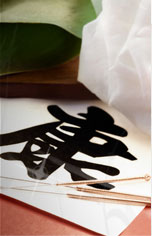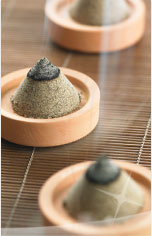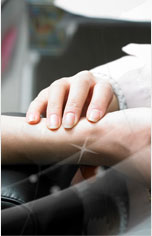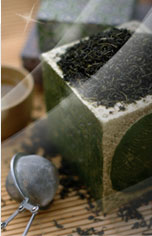
Premenstrual syndrome (PMS) is a combination of physical and emotional symptoms that many women experience about a week or two before their menstruation. Although the cause of PMS is unknown, many researchers believe that it is related to a change in estrogen and progesterone levels and serotonin levels at the beginning of the menstrual cycle. An increase in estrogen and progesterone can cause mood swings, anxiety, and irritability; change in serotonin levels also affects your moods, emotions, and thoughts. PMS symptoms go away within a few days after a woman’s period starts as hormone levels rise again.
It’s estimated that about 80% of menstruating women have experienced PMS. Most women experience one or more mild-to-moderate symptom that does not substantially affect daily functioning. For some women, PMS symptoms may be severe enough to affect everyday activities.1 PMS symptoms can vary month to month. Stress, nutritionally inadequate diet, lack of exercise and sleep as well as hectic or sedentary lifestyle can exacerbate the symptoms.
The potential signs and symptoms of PMS include:
|
Physical signs and symptoms
- Joint or muscle pain
- Cramping
- Headache
- Abdominal bloating or gassy feeling
- Breast tenderness
- Acne flare-ups
- Constipation or diarrhea
- Weight gain related to fluid retention
|
|
Emotional and behavioral signs and symptoms
- Mood swings and irritability or anger
- Depression, feelings of sadness, or crying spells
- Tension or anxiety
- Appetite changes or food cravings
- Sleep problems (sleeping too much or too little)
- Fatigue
- Trouble with concentration or memory
- Change in libido
|
|
|
PMS in TCM
Traditional Chinese medicine (TCM) believes that PMS is caused by a periodic flush of abundant Blood in Ren (Conception vessel / Sea of Yin) and Chong (Penetrating vessel / Sea of Blood), the two of eight Extra-ordinay Meridians. The uneven Blood distribution inside these meridians lead to a temporary disturbance of the Blood of the whole body and give rise to imbalance and dysfunction of Zang Fu organ systems, manifested by various physical and emotional symptoms including bloating, pain, fatigue, irritability and mood swings. After menstruation, when the Blood in the body redistributes and the organs resume their normal functions, PMS symptoms gradually disappear. PMS is cyclical in nature as the process starts again when Ren and Chong meridians become flushed with Blood before the next period.
In a normal, healthy menstrual process, a woman’s Essence stored in the Kidney will gradually be enriched to a particular level every month; the Kidney will then produce a substance called Tian Gui (Heavenly Water). Under the promoting action of Liver Qi, Ren and Chong meridians become exuberant and flushed with Blood. When the Blood in Ren and Chong meridians become overflowing, it drifts into the Uterus. Interacting with Tian Gui in the Uterus, the Blood from Ren and Chong meridians is transformed into menstrual blood. With the guidance of Liver Qi, Yang Qi in Du meridian makes this menstrual blood exit the Uterus during menstruation.
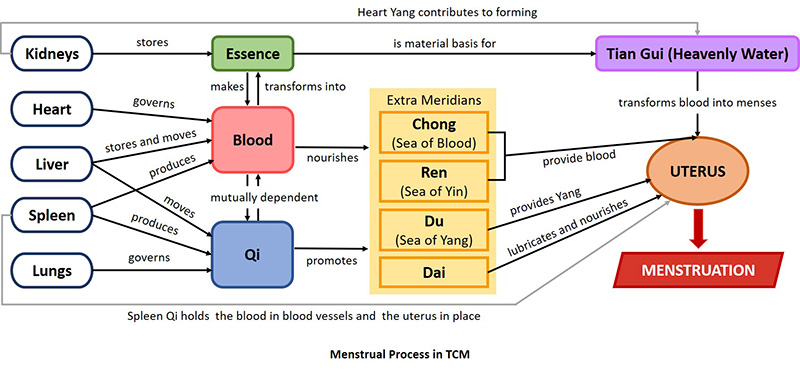
The free flow of Qi (the vital energy of the body) and Blood to Extra-ordinay meridians and the Uterus is essential for healthy menstrual process. The Liver in TCM is in charge of promoting the smooth flow Qi as well as storing and circulating Blood. If Liver Qi become stagnant, it will affect the flow of Qi and Blood throughout the entire body and lead to imbalances in other Zang Fu organs and meridians, especially Ren and Chong meridians and the Uterus before menstruation, because they are flushed with ample Blood. Emotional stress, such as anger, frustration and anxiety, can easily interfere with the flow of Blood and Qi, and improper diet, lack of physical activities or overwork can create functional disorders of organs; these factors contribute to the stagnation of Liver Qi, which is the predisposing conditions necessary for PMS to occur.
TCM Treatment for PMS
TCM treatments address disorders holistically and focus on treating the root cause, rather than just reducing symptoms. For PMS, a holistic approach is important because it is common for women with PMS to have accompanying menstrual or gynecological problems. TCM treatments can address PMS symptoms naturally, without medication, by restoring balance and harmony of the entire body, both physically and emotionally.
A personalized treatment plan will be designed for each patient after collecting information on presenting symptoms of PMS, any irregular manifestations during the whole menstrual cycle, emotional and physical state through complete medical history intake and a thorough diagnostic examination to determine what organ and meridian systems are out of balance. Healing time depends on the degree of imbalance in the organ systems. In general, it takes longer to restore the balance if multiple organs and meridians are involved. It may take a few cycles to show an overall improvement; however, alleviation of symptoms such as bloating or cramps can be seen soon after the first month or even after the initial treatment.
Acupuncture
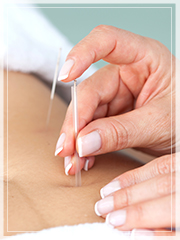
Acupuncture is a safe and effective form of treatment for PMS. Acupuncture restores hormonal balance and provides deep relaxation to help reduce stress, ultimately encouraging and supporting greater health and well-being of both body and mind. By inserting fine, sterile needles into specific points on the body, acupuncture stimulates and promotes the movement of Qi and Blood. When Qi and Blood circulate freely throughout the body, the balance and normal function of organs are restored; therefore, PMS symptoms are alleviated.
In 1997, the National Institute of Health (NIH) issued a consensus report that suggested acupuncture is effective in the treatment of menstrual cramps, and other symptoms associated with PMS.1 A systematic review published in 2014 revealed that acupuncture and herbal medicine treatments for premenstrual syndrome (PMS) and premenstrual dysphoric disorder (PMDD) showed a 50% or better reduction of symptoms compared to the initial state. In both acupuncture and herbal medical interventions, there have been no serious adverse events reported.2
Depending on TCM pattern differentiation diagnosis, different acupuncture points will be selected and different needling techniques will be applied to achieve the desired effect. For example, reinforcing techniques will be used to recuperate the under-functioning of organs or meridians; reducing techniques will be used to eliminate stagnation of Qi, Blood and Fluids and to suppress the hyper-functioning of organs or meridians.
Besides acupuncture, adjunctive modalities such as ear acupuncture, moxibustion or Gua Sha may be used to maximize the effect of acupuncture treatment.
Chinese Herbs
For most gynecological disorders, including PMS, Chinese herbal medicines are recommended to correct imbalance of the internal organs and to increase the effect of acupuncture treatments. Chinese herbs are used to boost Qi and Blood, balance Yin & Yang, and facilitate the circulation of Qi and Blood.
Chinese herbs are usually used in a combination of 2 to 30 herbs and are customarily prescribed for each patient. Herbs can be administered to a patient in many forms. Raw herbs can be taken on a brewed tea form. This herb tea form is strong and quick acting; however, it takes time for cooking and preparation and the taste can be quite strong initially. The herbs can also be prescribed in many other forms such as powder, capsule, pill, topical and tincture. Herbs possess many strengthening as well as therapeutic effects because of their content of various nutrients and vitamins, which are essential to the body. While Chinese herbal medicine can be very potent, it may take a few weeks to months before the full effects are noticed.
Nutritional Advice
- Drink plenty of fluids to ease abdominal bloating.
- Keep a balanced diet to improve your overall health and energy level.
- Eat plenty of fruits and vegetables.
- Avoid foods and drinks with caffeine, salt, sugar and alcohol, especially 2 weeks before your period.
- Folic acid, Vitamin B6, Vitamin D, calcium and magnesium may reduce cramps and mood swings.
Lifestyle Tips
- Get regular aerobic physical activity.
- Exercise can help with symptoms such as depression, difficulty concentrating, bloating and fatigue.
- Get enough sleep.
- Lack of sleep is linked to depression and anxiety and can make PMS symptoms such as moodiness worse.
- Find healthy ways to cope with stress.
- Talk to friends or write in a journal. Yoga, massage or meditation may be helpful.
- Don’t smoke.
- Smokers reported more problematic PMS symptoms than non-smokers.3
|

